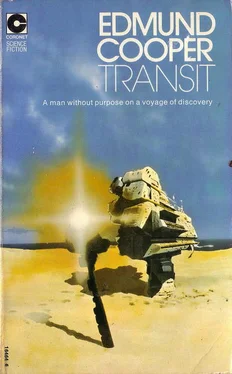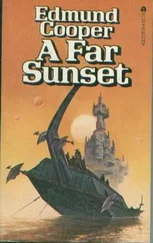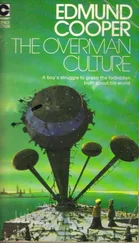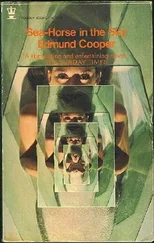So, though they were all hungry, they were not exactly starving. They had managed to erect one of the tents before darkness fell; and, as a chill evening breeze began to blow in from the sea, they all stumbled into it wearily and huddled together.
As Tom said: ‘If any of Mary’s strength-through-joy merchants want to play fun and games tonight, they’re welcome—provided the bastards don’t wake me up before they murder me.’
It expressed the general sentiments perfectly. Nobody had enough energy left to keep watch. But in spite of their fatigue, with the exception of Mary, who seemed to settle down quite well with Tom’s arms round her, they passed a troubled night.
When morning came, they were all stiff and sore. It had begun to rain heavily a little before dawn; and within the tent the sound of the rain was magnified.
But at last it stopped. Avery went outside and saw that the sky was clearing rapidly and that the sun, a hazy and watery yellow, was already well above the horizon and had broken through the fleecy banks of cloud.
He breathed in deeply, and savoured the clean rich sweetness of the morning air. Suddenly, in spite of his hunger, in spite of his lack of sleep, he felt good.
For a moment, he had a sharp mental vision of London in the morning rush hour. The Underground and buses packed with victims for the City’s concentration camps; the dull suburban eyes; the newspapers with crisis headlines of the latest antics of some overrated sex symbol of the silver screen; the idiotic pronouncement of politicians and sports columnists; the classrooms full of rebellious children; the anonymity of drowning alone in the great group frenzy that was life in a large city.
And, for a moment, with a feeling of shock he realized that he was glad not that he was away from London—at least, not that particularly—but that he had at last made contact with people. People like Barbara and Mary and Tom.
Then the feeling was swamped in nostalgia. And in his mind the zombies faded and the Underground was repopulated with interesting people; the newspapers were filled with international goodwill messages; and even the schoolroom was attractive.
He recognized the idealization for what it was and brushed it away. Neither that nor the first vision had been real. The truth—if there was such a thing as the truth—must lie somewhere half-way between.
Meanwhile, the inescapable fact was that, so far as he was concerned, London itself was no longer a fact.
The facts were companions, isolation and danger.
The immediate project was survival.
He called Tom out of the tent and together they went to search for fruit for breakfast. As they climbed down the side of their rocky citadel, Avery took the skin off some of his blisters.
The flesh underneath was raw and moist and pink. It began to sting a little, but he was glad of the pain. He felt it was the kind of stimulus he needed.
By the end of the morning, Camp Two was an organized and going concern. Three tents had been erected: the trunks, covered with the remaining tent, had been stacked two deep on the seaward side as a windbreak; and all the camping equipment, clothing and personal possessions that might have any immediate use had been stowed away in the spare tent.
Tom and Avery had gathered wood for a fire and had even found time to make a crude and shaky ladder, which proved to be only a very slight improvement on the one part of the rock face that could be climbed without much difficulty. However, they were rather proud of the ladder. It was the principle that mattered.
Tom also spent some time wandering up and down the beach, collecting smooth, roundish rocks between five and ten pounds in weight. These he dumped at the foot of the ladder; and when he had got about a couple of dozen he threw them up to Avery, who stacked them at regular intervals round the small citadel: ammunition in case of siege. There was going to be a warm reception if anyone tried to wreck their camp a second time.
That afternoon, leaving the gun with Mary and Barbara, the two men went hunting. They struck inland, but took care not to wander more than a couple of miles from camp. It was an irrational limitation because, at that distance, they had no means of knowing if all was well back at the rock; and at the same time it placed a futile restriction on the scope of the hunt.
However, neither of them wanted to venture farther. The memory of recent events was still too much with them. Probably, thought Avery, after a day or two they would regain confidence. But, despite the fact that they had left Mary and Barbara with a supply of rocks and the gun, and despite the fact that it would be difficult to storm the camp except by a determined group prepared to suffer casualties, they both became increasingly worried—but pointedly avoided mentioning Camp Two on the brief occasions when they found it necessary to talk.
It was partly this preoccupation that was responsible for the failure of the hunt. They saw several animals— chiefly at some distance and on patches of grassland— but their clumsy efforts at stalking drove the creatures away. Both Tom and Avery had become familiar enough with the reference cards to know the kind of animals for which they were looking and the kind which they hoped to avoid.
They found more of the latter. Tom trod on a snake which, fortunately, was more surprised than he was and slithered away with remarkable speed; and Avery almost walked into a basking rhinotype. According to the cards it was edible; but, recalling the experience of Barbara and Mary, Avery formed the opinion that it was going to take an awful lot of killing—hardly a job for light hatchets and knives.
They had back-tracked away from the rhinotype and circled round it at a respectful distance.
Time wore on, and it began to look as if all the useful animals had made previous arrangements to be elsewhere. Presently, they struck a stream—probably the one that supplied them with water—and decided to follow it for a while in the hope that they might catch some unsuspecting creature drinking. But apparently none were thirsty—or, more possibly, thought Avery, they had fairly regular drinking habits, and the hunt was just badly timed.
The stream, however, led them to an attractive glade, in which it broadened out into a long deep pool, served by a ragged cascade of water falling perhaps twenty feet from a rocky shelf at the far end. The pool itself was about fifty yards long, but at no point was it wider than about fifteen yards.
Tom sat on a boulder and wiped the sweat from his forehead. The afternoon had turned close and heavy; and if terrestrial weather was anything to go by, it was quite likely that there would be a thunderstorm before very long.
‘Let’s take a five-minute breather, and then push off home,’ suggested Tom. ‘We can pick up some fruit on the way back. The bloody animals are on strike today.’ Avery joined him on the boulder. ‘As soon as we can, we must do some systematic exploring inland,’ he said reflectively. ‘It would be one hell of a joke if we were only a few miles from some kind of civilization.’
‘Hilarious,’ agreed Tom without humour. ‘But somehow I don’t think it was the policy of the nuts that brought us here to dump us near anything useful at all…. Christ! Get down quick! ’
As he slid behind the boulder, Avery briefly followed Tom’s startled gaze. At the far end of the glade, near the waterfall, a man and a woman had appeared. They were tall, golden-haired, naked—except for a very brief kind of metallic apron hanging from the man’s waist, and a blue piece of fabric drawn between the women’s legs and apparently attached fore and aft to a cord round her hips.
‘Mary’s Greek types,’ whispered Tom, ‘literally in the flesh. Maybe they’re the very jokers who had fun with our camp. If so, I’ve a good mind to ’
Читать дальше












